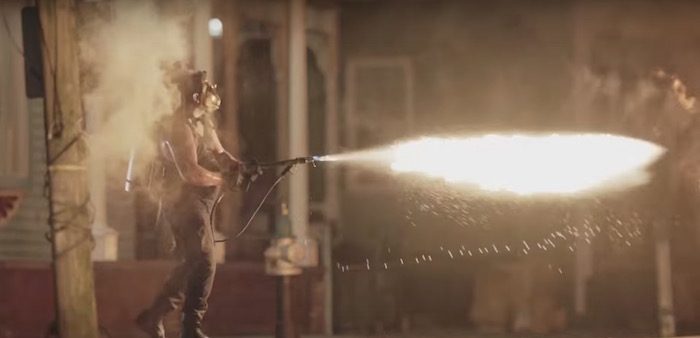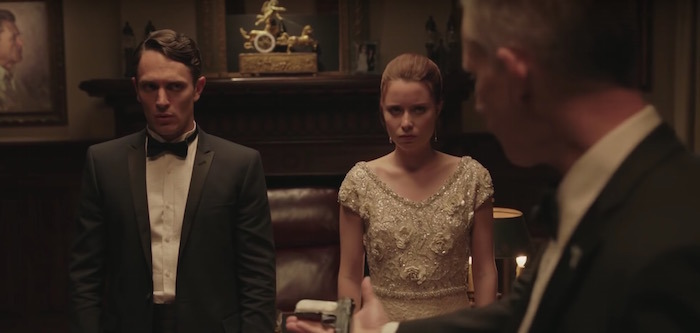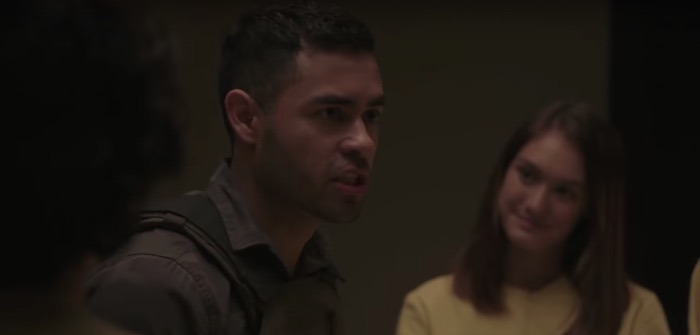The New 'The Purge' TV Series Aims To Be As Morally Ambiguous As Its Characters [Set Visit]
If there's one thing The Purge movies have taught us, it's that there's no telling how someone will react when presented with criminal impunity. Throughout the films, we've seen everyone from the poor to the rich, the white to the black, grapple with the spaces they occupy in a capitalist and white supremacist society, and how that motivates them on the night of the Purge — when all crime, especially murder, is completely legal. But while the films have raised questions of morality in a lawless state, they don't delve into each character's story and the personal conflicts they've faced throughout this intentionally established dystopia.
That's where the new TV adaptation comes in.

Premiering on USA Network on September 4, The Purge series will follow the stories — and backstories — of several characters from various sociopolitical backgrounds and how the American Dream, or the illusion thereof, impacts their actions on a single Purge night. According to showrunner/executive producer Thomas Kelly, it will do what every great genre does — entertain and provoke. "It's purely entertainment, a thrill ride. But I think for older, or more discerning audiences, the characters explore race or class and what reality is like for a really small percentage of people – and how that affects the way they live their lives," he said when I visited the New Orleans set back in June.
Caught in-between the series specific option of nonviolence by way of Pete's Cantina (the local bar and the only safe space on Purge night where no one can commit a crime) or the real-time atrocities of Purge night, even the most honorable characters agitate our expectations of what we think we would do if we could get away with it. More profoundly, what we would do if this was our absolute right as citizens granted by the New Founding Fathers of America (NFFA).
Moral Codes and Values Questioned
Take for instance, Lila (Lili Simmons), a young, very privileged white woman raised by a dad in the NFFA and who was taught to bolster the beliefs of the Purge. Now plagued with the moral conflict of who she is and who her parents expect her to be, she has to come to terms with the fact that even her best intentions may not be good enough. "There's this internal fight of 'I need to do this, but I shouldn't.' I'm trying to do good, but I need to do this first. It's very grey," Simmons said.
Jenna and Rick (Hannah Anderson and Colin Woodell), a loving married couple and expectant parents, also find themselves swept up into the allure of the Purge. They're good-natured working-class people dedicated to helping others. Rick in particular has been a bootstrapper all his life and is now at a point where he's desperate to see some return for all his effort. He sees that opportunity at the infamous Stanton party on Purge night, which boasts rich members of the NFFA who can broker just the deal he needs to catapult him to the next level — but that might mean sacrificing his moral code.
"We are two young individuals who aren't wealthy at all and are trying to fit in the wealthiest pedigree of people. That is the thrill element for us," Woodell explained. But of course, with the horrors of the night inevitable, they are forced to confront whether their motivations are really worth it, while keeping in mind that being inside the sprawling Stanton house means they're totally protected from the Purge. It's this kind of ethical dilemma that fans of the film franchise will find most intriguing. "I think if we're doing our jobs correctly, we make the audience question their own values," Anderson said.
Is There a Hero on Purge Night?
So, what happens when those values come wrapped in the guise of a hero? That's just what Miguel (Gabriel Chavarria) represents as an ex-marine compelled to venture out into the Purge when he receives a chilling letter from his sister Penelope (Jessica Garza), who pledges herself to be sacrificed under the decree of a charismatic cult leader. He goes out with every intention to save her, but in doing so he must also immerse himself in the cruelties of the night.
Even though Miguel comes face to face with cruelty, Chavarria appreciates the righteousness that his character embodies and the surprisingly peaceful moments that fall outside the Purge. "I think Pete's is really cool because it [shows that it's] not just senseless killing in every episode. There are a lot of good things happening throughout this night," the actor said. "[Miguel] loves his family and he's the hero of the show. I think the audience is going to root for him, vote for him, relate to him."
Another character who audiences will relate to is Jane (Amanda Warren), a black woman who played by all the rules and still found herself screwed in the process — which in turn unleashes a repressed rage. She thinks she's on the fast track to become partner at her firm, until she gets passed over on account of her gender and race. It doesn't take long for her to see the Purge as a way to retaliate against a system that is rigged against her. "The Purge has given her an opportunity to see something through," Warren said. What's most interesting about her character is that she intentionally — and not incidentally — engages in the Purge. She is determined to take back the power that has been stripped from her.
Still, while many may see Jane's actions — or any of the character's actions — as justifiable, Warren is very clear about everyone, no matter their motivation, plays a role in supporting the Purge simply by stepping outside their house that night. "In the world of the Purge, I've decided that a participant is someone who [is] not at a safe haven — whether it be by choice or involuntary — they are the predator or the one being preyed upon. But they are participating in Purge night."


